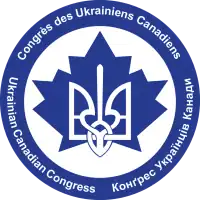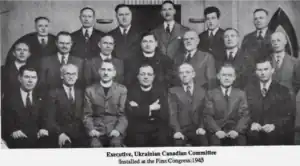Ukrainian Canadian Congress
The Ukrainian Canadian Congress (UCC; Ukrainian: Конгрес Українців Канади; French: Congrès des Ukrainiens Canadiens) is a nonprofit umbrella organization of Ukrainian-Canadian political, cultural, and religious organizations founded in 1940.
 | |
| Formation | November 6, 1940 |
|---|---|
| Legal status | Nonprofit organization |
| Headquarters | Winnipeg, Manitoba, Canada |
| Method | Political advocacy, lobbying, cultural activities |
President | Alexandra Chyczij |
CEO | Ihor Michalchyshyn |
| Website | ucc |
History
Pre-UCC

Ukrainians immigrated to Canada at the turn of the century, settling mostly in rural areas of the prairie provinces. Given the church services were required all the more by the new settlers, and in 1918 the autonomous Ukrainian Greek-Orthodox Church of Canada was established. Between 1903 and 1920 Ukrainian Canadians started many organizations and institutions (Ridna Shkola, Taras Shevchenko Institute in Edmonton, Andrey Sheptycky Ukrainian Bursa in Winnipeg among others).
With the outbreak of WWI many Ukrainian immigrants were detained being deemed "enemy aliens" as they arrived from countries at war with Canada. Formed in 1917, the Ukrainian Canadian Citizens' Committee, consisting of various lay and church organizations sent a delegation to Ottawa to protest the classification of immigrants from western Ukraine as "enemy aliens".
A number of organizations became active in the '20s and '30s including USRL, UNF, the Ukrainian Catholic Brotherhood and others.
The need for unified action by the Ukrainian community became urgent in 1938 to react to events affecting Ukrainians in Europe and the beginning of WWII. The community was anxious to unite under one representative committee.
The final and conclusive impetus for unity came from the National War Services of Canada which was anxious that young Ukrainians enlist in military services.
Originally known as the Ukrainian Canadian Committee (by which it was known until 1989), it was established as a result of the efforts of the Ukrainian Canadian community in November 1940. The main reason that UCC was formed was to have an umbrella organization which could speak for all Ukrainian Canadians and co-ordinate their common goals.[1]

The first congress of Ukrainian Canadians occurred June 22-24, 1943. This was attended by over 600 Ukrainian Canadians. The slogan of this congress was "Victory and Freedom".
In 1952 to combat Soviet propaganda, radio services such as the Voice of America and Radio Canada International Ukrainian-language service, broke through the information blockade and broadcast into the Soviet Union. This was achieved in no small part due to the hard work of the UCC and the Ukrainian Congressional Committee of America.
By 1959, during the sixth Congress of Ukrainian Canadians 25 organizations comprised the membership of the UCC. Resolutions were approved dealing with financial, organizational, social, educational, cultural and political issues as well as student and women's activities, all aimed at strengthening the community and the UCC.

In August 2022, Russia designated the Ukrainian Canadian Congress as an "undesirable organization".[2]
Leadership
The UCC National President is Alexandra Chyczij. The previous UCC National President was Paul M. Grod (2007–2018), who later became the President of the Ukrainian World Congress.
| No. | Name | Term of office | Duration | |
|---|---|---|---|---|
| 1 | Wasyl Kushnir | 1940 | 1953 | 13 years[lower-alpha 1] |
| 2 | Antony Yaremovich | 1953 | 1957 | 4 years |
| 3 | Serge Sawchuk | 1957 | 1959 | 2 years |
| – | Wasyl Kushnir | 1959 | 1971 | 12 years[lower-alpha 1] |
| 4 | Dr. Peter Kondra | 1971 | 1974 | 3 years |
| 5 | Serge Radchuk | 1974 | 1980 | 6 years |
| 6 | John Nowosad | 1980 | 1986 | 6 years |
| 7 | Dmytro Cipywnyk | 1986 | 1991 | 5 years |
| 8 | Oleh Romaniw | 1991 | 1998 | 7 years |
| 9 | Eugene Czolij | 1998 | 2004 | 6 years |
| 10 | Orysia Sushko | 2004 | 2007 | 3 years |
| 11 | Paul M. Grod | 2007 | 2018 | 11 years |
| 12 | Alexandra Chyczij | 2018 | Present | 6 years |
Shevchenko Medal
The UCC has issued the Shevchenko Medal to the following recipients within the last ten years:
2013 Triennial Conference (Toronto)
- Juriy Darewych
- Edward Klopoushak
- Iryna Mycak
- Roman Borys
- Peter Shostak
- Juliette Augustine Sysak Cavazzi
- Daria Darewych
- Valentina Kuryliw
- Iroida Wynnycka
2016 Triennial Conference (Regina)
- Daria Vera Luciw
- Halya Lypska Wilson
- Paul Migus
- Yuri Shymko
- Olya Odynsky-Grod
- Myroslava Pidhirnyj
- Tanya Dzulynsky
- Iryna Jendrijewska
- Mary Pidkowich
- Nestor Olynyk
- Orysia Tracz
- Ken Krawetz
2019 Triennial Conference (Ottawa)
- Roman Waschuk
- Irena Bell
- Bohdan Kordan
- Paul Grod
- Markian Shwec
- Ron Cahute
- Zorianna Hrycenko-Luhova
- Oksana Rewa
- Oleh Romanyschyn
- Orest Steciw
- Borys Sydoruk
- Mary Ann Trischuk
- Lt. Gen. Paul Wynnyck
2022 Triennial Conference (Winnipeg)
- Ukrainian National Federation of Canada
- Ukrainian Shumka Dancers
- Irene Shust-Dankowycz
- Leslie B. Salnick
- Taras Pidzamecky
- Pavlo Lopata
- Andrew Hladyshevsky
- Victor Hetmanczuk
- Jaroslaw Balan
- Wayne Babych
- Dave Babych
- Hon. Lloyd Axworthy
Members
Provincial Councils and Branches
There are six Provincial Councils under the UCC National umbrella, which bring together hundreds of provincial Ukrainian Canadian community groups.
Branches of the Ukrainian Canadian community work at the local/civic level. They are all under the umbrella of UCC National however they are separate legal entities.
- Alberta Provincial Council
- Calgary
- Edmonton
- British Columbia Provincial Council
- Vancouver
- Victoria
- Manitoba Provincial Council
- Ontario Provincial Council
- Bradford
- Durham Region
- Hamilton
- London
- Niagara
- Ottawa
- Toronto
- Waterloo - Wellington
- Windsor
- Quebec Provincial Council
- Montreal
- Saskatchewan Provincial Council
- Canora
- Regina
- Saskatoon
- Yorkton
- Other Local Branches
- Halifax
- Prince Edward Island
Member organizations
In addition to its provincial councils and local branches, the Ukrainian Canadian Congress consists of numerous national members:
- Canada-Ukraine Chamber of Commerce
- Canada-Ukraine Foundation
- Canadian Ukrainian Immigrant Aid Society
- Council of Ukrainian Credit Unions of Canada
- League of Ukrainian Canadians
- League of Ukrainian Canadian Women
- Ukrainian Youth Association in Canada
- Plast Ukrainian Youth Association in Canada
- Shevchenko Scientific Society of Canada
- UFSC Heritage Life Insurance
- Ukrainian Canadian Bar Association
- Ukrainian Canadian Foundation of Taras Shevchenko
- Ukrainian Canadian Professional and Business Federation
- Ukrainian Canadian Research and Documentation Centre
- Ukrainian Canadian Social Services of Canada Headquarters
- Ukrainian Canadian Students' Union
- Ukrainian Canadian Veterans' Association
- Ukrainian Catholic Brotherhood of Canada
- Ukrainian Catholic Women's League of Canada
- Ukrainian Catholic Youth and Young Adults
- Ukrainian National Association
- Ukrainian National Federation of Canada
- Ukrainian National Youth Federation of Canada
- Ukrainian War Veterans Association of Canada
- Ukrainian Womens' Organization of Canada
- Ukrainian Self-Reliance League of Canada
- Canadian-Ukrainian Youth Association
- Ukrainian Museum of Canada
- Ukrainian Self-Reliance Association
- Ukrainian Orthodox Youth of Canada
- Ukrainian Women's Association of Canada
- Ukrainian Self-Reliance League of Canada
Source:[3]
Notes
- For a total of 25 years.
References
- Kondra, Peter (1993). A Review of Half Century of Leadership. Winnipeg, Canada: Trident Press Limited. p. 1.
- "Российский Минюст объявил "нежелательными" три канадских организации. Две из них связаны с Украиной". Meduza (in Russian). 2022-08-19. Retrieved 2022-09-01.
- "Membership - The Ukrainian Canadian Congress (UCC) official website". 2020-02-19. Retrieved 2022-12-04.
External links
- Ukrainian Canadian Congress
- Archives of the Ukrainian Canadian Congress, under of the former name Ukrainian Canadian Committee (Ukrainian Canadian Committee, or, Komitet Ukrayints's iv Kanady fonds, R3729) are held at Library and Archives Canada